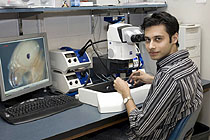Rajendhran "Rajee" Rajakumar
ph.d student, montreal
e-mail: rajendhran.rajakumar@mail.mcgill.ca
Ever since graduating from Concordia University with a BSc in Cell & Molecular Biology, I have been immersed in the field of Evo-Devo in Dr. Abouheif's lab. My research is aimed at understanding the development and evolution of wing polyphenism in ants. More specifically I am interested in understanding how developmental regulatory mechanisms involved in growth have evolved to give rise to wing polyphenism.
There are three main focuses of my work. First I have been trying to build a molecular phylogeny of ants in order to study the evolutionary dynamics of vestigial wing disc morphology in the wingless worker castes. By doing this, we will be able to derive the ancestral origins, rate of evolution as well as the contrast of conservation versus lability of these vestigial wing discs and the underlying gene patterning network. Second, I have been studying aspects of ‘superorganismal’ regulation, its effects on the ontogeny of a colony as well as the part it plays in caste determination and evolution of caste polyphenisms. Finally, and most importantly, I am currently conducting in vitro/in vivo transplantations of imaginal discs. These experiments consist of both inter- and intraspecies transplantations. There is potential for vestigial discs to transdetermine and recover growth if transplanted into a host where the discs normally grow or the opposite can be done as well to observe suppression of growth. This might determine potential genes involved in epistatic relationships with the wing-patterning network. Also, if successful they will further allow us to understand how environmental influences are filtered through hormones. These hormones potentially mediate the genes that regulate cell proliferation, patterning and phenotypic plasticity. The questions of how imaginal discs are regulated extrinsically through hormones, as well as intrinsically through the discs potential modularity will hopefully be answered.
Overall, this research will contribute to the further understanding of how (developmentally) and why (evolutionarily) gene networks underlying polyphenism are controlled environmentally.
